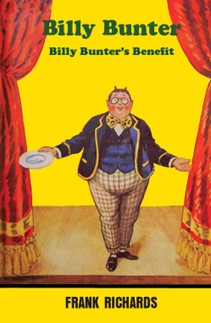
Billy Bunter, the Owl of the Remove was not able to go cycling. For, with the selfishness to which he was sadly accustomed, his battered and unusable old one had not been repaired by any other Removite, though he had mentioned the matter more than once. There was, of course, the difficulty of finding the purchase money, but eventually Bunter evolved the tremendous scheme of ordering the bike and sending the bill to his father. Unfortunately, the latter did not approve, and the bill rebounded.
Bunter's frantic efforts to find the sum necessary to pay Parker's Cycle Stores – including entering for the Latin prize and following the sport of kings – make this one of the funniest stories yet in this much-beloved series.
An additional source of joy concerns the two rival productions of "Hamlet", under the able direction of William Wibley of the Remove, and the not nearly so able direction of that indefatigable busybody, Coker of the Fifth.
The reader is warned to take this book to a place where his peals of laughter will not excite public attention.

FRANK RICHARDS was the pen name of CHARLES HAMILTON.
***
Charles Harold St. John Hamilton (8 August 1876 – 24 December 1961) was an English writer, specializing in writing long-running series of stories for weekly magazines about recurrent casts of characters, his most frequent and famous genre being boys public school stories, though he also wrote in other genres. He used a variety of pen-names, generally using a different name for each set of characters he wrote about, the most famous being Frank Richards for the Greyfriars School stories featuring Billy Bunter. Other important pen-names included Martin Clifford (for St. Jim's), Owen Conquest (for Rookwood), Ralph Redway (for The Rio Kid) and Hilda Richards (for Bessie Bunter). He also wrote hundreds of stories such as the Ken King stories for The Modern Boy.
Amalgamated Press started a new story paper for boys called The Gem in 1907 and by issue number 11 it had established a format: the major content was to be a story about St. Jim's school, starring Tom Merry as the main character and written by Charles Hamilton under the pen name of Martin Clifford. This paper rapidly established itself and, to capitalize on its success, a similar venture was launched in 1908. This was to be known as The Magnet. The subject matter was a school called Greyfriars and Hamilton was again to be the author, this time using the name Frank Richards.
In 1915, Hamilton started a third school series for Amalgamated Press, Rookwood, this time under the name Owen Conquest and featuring a leading character called Jimmy Silver. These appeared in the Boys' Friend Weekly, and were shorter than the Greyfriars and St. Jim's stories.
These three schools took up most of Hamilton's energies over the following 30 odd years and make up the work for which he is best remembered. His 'golden age' is generally considered as being the period from about 1925 to about 1935. In all he provided stories for 82 per cent of the issues of The Magnet and two thirds of the issues of The Gem.
Following the winding up of The Magnet, in 1940, Hamilton was not able to continue the Greyfriars saga, as Amalgamated Press held the copyright and initially would not release it. But by 1946 they changed their mind and granted Richards permission to write the Greyfriars stories again. He then signed a contract with publishers Charles Skilton for a hardback series, the first volume of which, Billy Bunter of Greyfriars School, was published in September 1947. The series continued for the rest of his life, but with Skilton transferring rights to Cassell in 1952. In addition, Hamilton, under the pen names above wrote further books featuring St. Jim's, Rookwood and Cliff House (the Bessie Bunter series), as well as the television scripts for seven series of Billy Bunter stories for the BBC.
Frank Richards died on 24 December 1961, aged 85, and was cremated at the Kent County Crematorium at Charing. He is estimated to have written about 100 million words in his lifetime (that's the equivalent of 1,200 average-length novels) and has featured in the Guinness Book of Records as the world's most prolific author.
FRANK RICHARDS
FRANK RICHARDS
FRANK RICHARDS
FRANK RICHARDS
FRANK RICHARDS
FRANK RICHARDS
FRANK RICHARDS
FRANK RICHARDS
FRANK RICHARDS
FRANK RICHARDS
FRANK RICHARDS
FRANK RICHARDS
FRANK RICHARDS
FRANK RICHARDS
FRANK RICHARDS
FRANK RICHARDS
FRANK RICHARDS
FRANK RICHARDS
FRANK RICHARDS
FRANK RICHARDS
FRANK RICHARDS
FRANK RICHARDS
FRANK RICHARDS
FRANK RICHARDS
FRANK RICHARDS
FRANK RICHARDS
FRANK RICHARDS
FRANK RICHARDS
FRANK RICHARDS
FRANK RICHARDS
FRANK RICHARDS
FRANK RICHARDS
FRANK RICHARDS
FRANK RICHARDS
FRANK RICHARDS
FRANK RICHARDS
FRANK RICHARDS
FRANK RICHARDS
FRANK RICHARDS
FRANK RICHARDS
FRANK RICHARDS
FRANK RICHARDS
FRANK RICHARDS
FRANK RICHARDS
FRANK RICHARDS
FRANK RICHARDS
FRANK RICHARDS
FRANK RICHARDS
FRANK RICHARDS
FRANK RICHARDS
FRANK RICHARDS
FRANK RICHARDS
FRANK RICHARDS
FRANK RICHARDS
FRANK RICHARDS
FRANK RICHARDS
FRANK RICHARDS
FRANK RICHARDS
FRANK RICHARDS
FRANK RICHARDS
FRANK RICHARDS
FRANK RICHARDS
FRANK RICHARDS
FRANK RICHARDS

